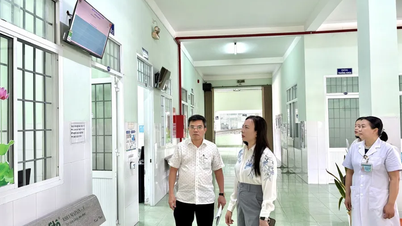The hospital received many cases of complications.
In recent weeks, many schools in Hanoi have recorded a large number of students having to stay home from school due to influenza A. At An Hung Primary School (Duong Noi Ward, Ha Dong District), there was a time when 20-30 students were absent from a class, making the classroom atmosphere much thinner than usual.
Mr. Nguyen Van Dung, the parent of a third grader at the school, said his child contracted influenza A and had to stay home for nearly a week. “Last week, every day of the week, there was a student in my child’s class who was absent. There was a day when nearly half the class was absent. Parents are very worried because the disease spreads quickly; if one student gets sick, a few days later, many more students will be absent,” he said.

The health sector recommends that parents should vaccinate their children every year to prevent the flu.
Similarly, in Hoang Mai district, Ms. Phan Thi Thanh Van said that both her children had the flu and had to be treated for many consecutive days. “There was a day when my son’s class was absent up to 10 students. After the older class, it was the younger class. After a few days of recovery, we heard that a new student was sick,” she shared. In Tay Ho district, Mr. Tran Tuan Dung also said that his daughter’s class continuously recorded students absent from school. “There were days when the class was absent up to 15-20 students out of a total of 45. Teachers are having to flexibly adjust their lessons so that students are not interrupted too much,” he said.
According to hospital records, the number of influenza A cases in the community is increasing, especially in young children. This group is at high risk of serious complications if not detected and treated promptly. At the Central Hospital for Tropical Diseases, nearly 50 patients with influenza A are being treated as inpatients, most of them children. The number of outpatient visits for influenza has also increased dramatically in just a few weeks.
Baby TTH (Hanoi) was brought to the hospital with a persistent high fever, severe cough, and fatigue. Test results showed that the baby was positive for influenza A, with bronchial and lung damage. A high white blood cell count indicated a severe secondary infection. Thanks to early treatment, the baby's condition improved after two days.
In another case, HL (10 years old, Hanoi) was hospitalized with a fever of over 39.5°C, severe cough, vomiting a lot, sometimes vomiting blood. The child had to be intensively treated for many days to stabilize his breathing and eating.
At the National Children's Hospital, since the beginning of October, more than 3,700 children have been admitted for flu treatment, nearly 500 of whom have required hospitalization. Many cases have complications such as pneumonia, otitis media, and even convulsions due to high fever.
Master Nguyen Dinh Dung - Central Hospital for Tropical Diseases, said that influenza A is easily spread through the respiratory tract and can occur in all ages. "The early stages of influenza A are quite similar to the common cold, so it is easy to be subjective. However, the disease can progress rapidly, causing pneumonia or respiratory failure if not monitored and treated early," he said.
Not only Hanoi, many other provinces and cities also recorded a sharp increase in the number of influenza A cases. In Khanh Hoa, the number of visits due to influenza increased from 5 cases in September to 657 cases in October, of which 456 cases had to be hospitalized. In Ha Tinh , on average, more than 10 influenza A patients came to the clinic every day, many children had to be hospitalized due to respiratory complications.
Proactive disease prevention, annual vaccination
Doctors recommend that parents closely monitor their children’s health during the changing seasons. Children with high fever, prolonged cough, difficulty breathing, loss of appetite, fatigue or rapid breathing should be taken to a medical facility immediately. Avoid using antibiotics or long-term fever-reducing drugs on your own.
If someone in the family has the flu, they should wear a mask when in contact, practice good hand hygiene, limit sharing of personal items, and ensure the room is well ventilated. Sick children should stay home from school to avoid spreading the virus.
The important solution emphasized by experts is to get vaccinated against seasonal flu every year. Dr. Dao Huu Than - Head of the Department of Infectious Disease Prevention, CDC Hanoi, said that the flu vaccine has been proven safe, helping to reduce the risk of illness and serious complications. "In particular, children from 6 months to under 5 years old, the elderly and people with underlying diseases need to be fully vaccinated to prevent complications" - Dr. Than emphasized.
Dr. Le Thi Kim Hoa, representative of the Safpo/Potec vaccination system, said that seasonal influenza viruses are constantly changing, so annual booster shots are necessary. “Each year, the influenza virus can change its circulation pattern, so the vaccine is also updated to match the new strain. Vaccination before the winter-spring season will help the body have protective immunity throughout the epidemic season,” Dr. Hoa said.
The World Health Organization (WHO) maintains a global influenza surveillance network to identify circulating strains and advise manufacturers to adjust vaccines accordingly for each region. Vietnam is in the Northern Hemisphere, so people should get vaccinated against influenza between August and October every year.
Source: https://kinhtedothi.vn/hoc-sinh-nghi-hoc-hang-loat-vi-cum-a-bung-phat.903453.html





![[Photo] Prime Minister Pham Minh Chinh chairs a meeting on housing policy and the real estate market.](https://vphoto.vietnam.vn/thumb/1200x675/vietnam/resource/IMAGE/2025/11/11/1762838719858_dsc-2107-jpg.webp)
![[Photo] Chu Noodles - the essence of rice and sunshine](https://vphoto.vietnam.vn/thumb/1200x675/vietnam/resource/IMAGE/2025/11/11/1762846220477_ndo_tl_7-jpg.webp)





















































































![Dong Nai OCOP transformation: [Article 4] Reaching national standard products](https://vphoto.vietnam.vn/thumb/402x226/vietnam/resource/IMAGE/2025/11/11/1762825820379_4702-cac-san-pham-trai-cay-chung-nhan-ocop-nongnghiep-174649.jpeg)



![Dong Nai OCOP transition: [Article 3] Linking tourism with OCOP product consumption](https://vphoto.vietnam.vn/thumb/402x226/vietnam/resource/IMAGE/2025/11/10/1762739199309_1324-2740-7_n-162543_981.jpeg)






Comment (0)